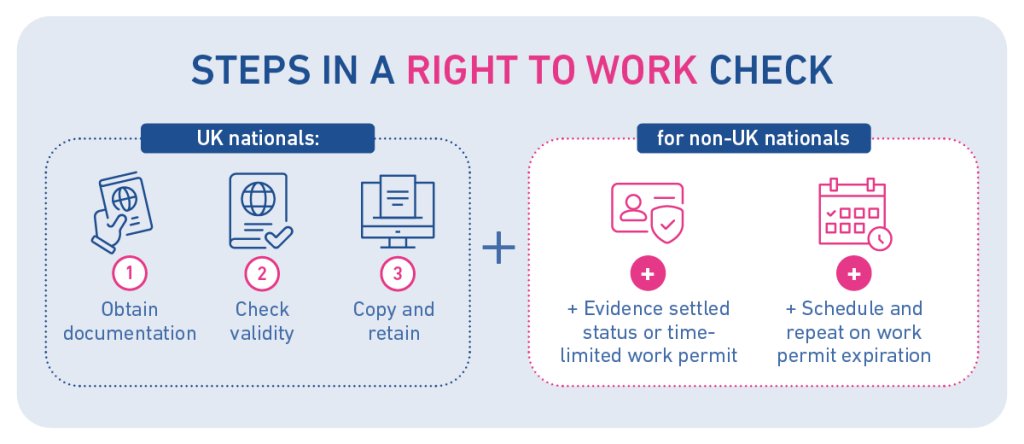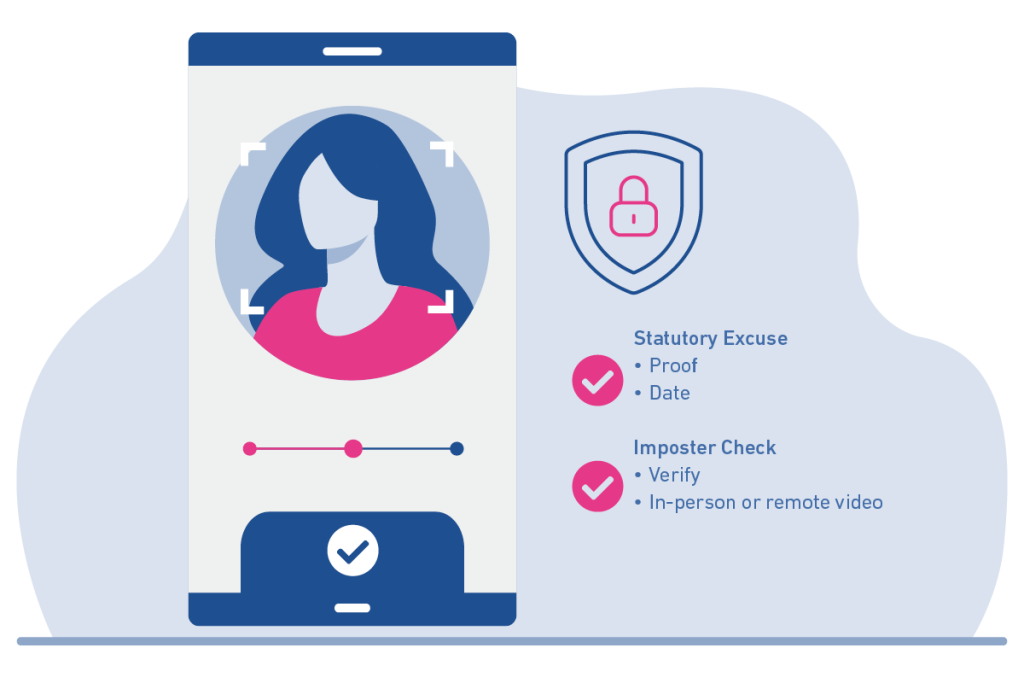Right to Work Checks in the UKAn employer’s guide to getting Right to Work (RTW) checks correct and how to make sure you have a statutory excuse for every employee – at scale.
Guide
Why do Right to Work checks matter for your business?
Employers must conduct Right to Work checks to comply with legal obligations and avoid severe penalties, now up to £60,000. These checks are not just about verifying identity but consider complex risk factors, such as the candidate’s origin and the documents provided. As an employer you need to conduct Right to Work checks to obtain a ‘statutory excuse’ against civil penalties. They introduce administrative burdens, increase costs, and are harder to implement across remote teams, exposing businesses to risks. Employers must prioritise robust Right to Work processes to ensure compliance and safeguard their operations.
What are Right to Work checks?
Right to Work checks are a legal requirement for UK employers to verify that their employees are authorised to work in the country. These checks involve obtaining, verifying, and copying specific documents based on the candidate’s nationality and immigration status. Every employer, regardless of the role or company size, must carry out these checks to comply with UK law.
While Right to Work checks focus on employment eligibility, some roles may also require additional screening, such as DBS checks for safeguarding or financial background assessments for specific positions.

For UK nationals
For UK nationals, the Right to Work check is usually a one-time requirement completed at the start of employment. UK legislation dictates that employers must:
- Obtain the right documentation to prove an employee’s Right to Work in the UK
- Check that the documentation is valid and compliant
- Copy the documentation and keep it on file in case of an audit.
You should then ensure that records are kept for a minimum of two years after the employee leaves your employment, as required by UK law.
What is an IDSP?
An IDSP (Identity Service Provider) is an external organisation that uses Identity Verification Technology (IDVT) to confirm the authenticity of documents provided by employees, such as passports or biometric residence permits.
IDSPs can be used for remote Right to Work checks, verifying the eligibility of UK residents with appropriate documentation, but a more comprehensive approach is required for complete checking of UK and non-UK applicants
For non-UK nationals
For non-UK nationals, conducting Right to Work checks involves additional steps due to variations in immigration status. Some individuals may have settled or pre-settled status under the EU Settlement Scheme, while others may hold time-limited work visas or permits, which require ongoing monitoring and periodic re-verification.
For time-limited work permissions, it is crucial to track expiration dates and ensure timely renewals to remain compliant with legal requirements. Using a system that automatically stores expiration dates, securely stores documentation, and sends reminders for renewals can help maintain compliance efficiently.
Importantly, Right to Work checks go beyond simply looking at identification documents. Businesses must adhere to a structured, government-approved process to protect themselves from penalties should something go wrong. This includes making sure you have a statutory excuse for each of your employees, and that you could provide proof of this if you were audited.
What is a statutory excuse?
A statutory excuse is a legal protection for employers in the UK that helps avoid penalties when hiring staff. By following the correct steps to check an employee’s Right to Work, businesses can ensure they won’t face consequences if the employee is later found to be ineligible.
Essentially, having a statutory excuse means you’ve done your due diligence in verifying an employee’s work status, which provides you with legal reassurance if you’re ever audited.

How do I get a statutory excuse?
So, now you know that getting a statutory excuse is essential for protecting your business from potential penalties, how do you go about getting one?
You will have a statutory excuse for each employee if you can provide:
- Proof that you obtained, checked and copied valid documentation
- The date that the Right to Work check took place
If the Right to Work check took place remotely, you also need to complete an imposter check on day one of the person’s employment. This verifies that the person presenting the documents is the individual in question and you can do this either in person or via a video call.
Key takeaway
If you do not complete the imposter check for a remote hire, you do not have the required statutory excuse.
Many organisations don’t realise that missing a document or skipping a step could leave them exposed to penalties. So, by being diligent about this process, you can protect your business and minimise the risks of non-compliance.
How you store your Right to Work checks is key
Imagine a large company with hiring managers in various regions, each responsible for their own recruitment processes.
Although they have conducted Right to Work checks for every employee, due to a lack of standardised procedures each manager has developed their own methods for conducting and storing them. Some may rely on physical documents stored in local HR files, while others might use spreadsheets or cloud storage without consistent record-keeping practices.
This disparate approach means that if the UK Border Force conducts an audit of the entire workforce, the company faces a significant challenge. They are asked to provide proof for all employees, but the data is scattered across multiple formats and locations. It can be incredibly time- and cost-intense to collate all of this information, especially to an audit deadline.
Key takeaway
Ensuring you have a streamlined Right to Work process and storage system across your entire business is fundamental to protecting your business from penalties.
Legislation updates and fines
The landscape of Right to Work compliance is rapidly evolving, especially with the rise of remote work. Recent legislative changes and digital identity solutions have transformed how employers conduct Right to Work checks.
Fines
As of early 2024, fines for non-compliance have escalated dramatically to £45,000 for first offences and £60,000 for repeat offences.
Digital biometrics
Physical documentation for non-UK nationals is being phased out by 31 December 2024 in an effort to go fully digital. From the start of 2025, biometric residence permits will be fully digital and businesses will need Right to Work systems that reflect this.
These developments highlight the need for businesses to stay informed about their responsibilities under the law. Failure to adapt can lead to significant financial repercussions, so it’s important for employers to understand the latest requirements and ensure compliance, as well as being prepared for what the future of employment might look like.
Key takeaway
From 2024, non-compliance fines have risen sharply, while by 2025, businesses will need digital Right to Work systems as physical documentation for non-UK nationals is phased out in favour of fully digital biometrics.
Large organisations: Where it gets tricky
Rolling out a consistent Right to Work check process across a large organisation can be quite challenging. Here are some key difficulties that it’s important to be aware of as an employer in order to mitigate risk:
- Consistency at scale: Implementing the full Right to Work check process consistently across multiple branches or departments is no small feat. Different hiring managers may adopt varied methods, leading to discrepancies in how checks are conducted and documented.
- Effective training: Ensuring that hiring managers and HR staff are well-trained in the most up-to-date compliance requirements is crucial, yet often difficult. Without proper training, there is a higher risk of errors, which can result in non-compliance and potential penalties.
- Record keeping: Storing records properly poses another challenge. Many organisations encounter record-keeping issues, which can complicate audits. If documents are not organised or stored in a consistent manner, retrieving the necessary information can become a cumbersome task.
- Imposter checks: With the increasing prevalence of remote Right to Work checks, keeping track of imposter checks becomes more complex. Verifying the identity of candidates in person is often replaced by remote checks, which can lead to lapses if not managed carefully.
This highlights the importance of working with reliable Identity Service Providers (IDSPs). IDSPs are certified entities that specialise in conducting Right to Work checks. While some providers may offer Right to Work checks (i.e confirming that identity documentation provided is authentic – this is simply an identity check), that is only one part of obtaining a statutory excuse.
Key takeaway
Make sure that, if you work with an IDSP, their service includes critical components such as imposter checks and effective record storage. If a business only obtains an identity check from an IDSP, they have not achieved a statutory excuse.
For complete compliance and peace of mind, look for a solution that offers:
- Streamlined, centralised storage that you can use across your entire business.
- A simplified process for both hiring managers and prospective employees so that documentation can be uploaded, checked and stored with ease.
- Reminders and checklists for key aspects like visa expiry dates and imposter checks to ensure that you remain compliant, even at scale.
I have done a lot of customer research with high profile employers across different sectors, and the overwhelming feedback was that they needed operational efficiency. A single process which enabled them to manage Right to work checks in line with legislation, regardless of where the candidates came from or the documents they had.”
– Phil Blasdale, Head of Product HRDI
Impact and risk of not getting a statutory excuse
Failing to secure a statutory excuse can heavily impact businesses, especially as compliance regulations tighten. For SMEs, which make up 99% of UK businesses, non-compliance risks are especially severe, as these companies lack the financial resources of larger corporations. A single oversight could result in substantial fines – £45,000 fine for the first offence – and put operations at serious risk.
While SMEs may struggle with fines, larger firms are typically more financially resilient and better able to absorb these penalties. They can afford the fines, but can they afford the reputational damage?
Larger businesses are especially vulnerable to the lasting effects of negative publicity, which can erode customer trust and harm brand reputation. The UK Border Agency has the authority to publish the names of businesses that fail to comply with Right to Work regulations, leading to media exposure that may impact public perception and relationships. For many large corporations, such damage can be difficult to repair, despite their established market presence
Right to Work FAQs
Many employers run into issues like not keeping track of work permit expiration dates, not having enough training for hiring managers on Right to Work requirements, and struggling to keep accurate records of compliance documentation. These challenges can lead to missed deadlines and potential penalties.
Delays often happen because of incomplete or incorrectly submitted paperwork, processing errors, or not following up with non-UK nationals whose work permissions might be running out. These hiccups can slow down the onboarding process and disrupt business operations.
That’s why solutions that are simple to use for both staff and prospective employees are crucial.
Rejections can be one of the biggest recruitment challenges and can happen for a few reasons, such as expired IDs, missing documents, or mistakes made during the verification process. When this occurs, it can complicate hiring and compliance efforts.
To tackle Right to Work issues effectively, it’s helpful to have a standardised process in place. Make sure your hiring managers and HR staff receive thorough training. Using reliable Right to Work tools can also help to streamline your compliance checks and help avoid common pitfalls, ensuring that all necessary documentation is collected and kept organised.
A 360-degree ecosystem: With the Experian candidate app, you get a flexible Right to Work solution that supports both face-to-face and remote verification. The app’s built-in checklist ensures every step of the verification process is completed, helping you avoid common compliance pitfalls. For more insights into how digitisation is transforming the vetting process, check out our article on digitisation in the vetting world.
How can we help?
Experian knows that a reliable Right to Work solution is key to simplifying your recruitment process and ensuring compliance. Our approach helps businesses navigate Right to Work checks easily, enhancing candidate experiences and streamlining operations.
Empower your hiring process: Our solutions include step-by-step support, from the documents needed to imposter check reminders. So you can verify candidate identities effectively and protect your organisation from compliance risks. With secure cloud storage, you’ll have easy access to vital documentation, ensuring accurate record-keeping.
Streamlined onboarding: A quick onboarding process is beneficial for both hiring teams and candidates. Our Right to Work solution reduces delays and recruitment costs, allowing you to focus on building a talented workforce.












